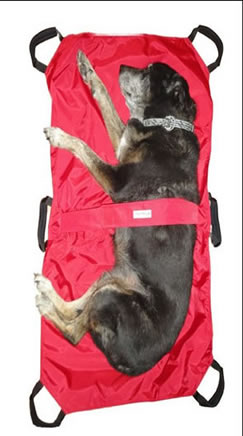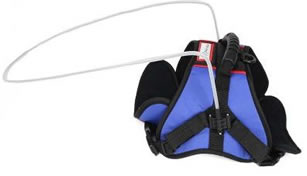Getting Financial Assistance for your Disabled Dog in the United States & Canada:
It can get expensive dealing with a disabled dog. Veterinary medical bills, orthotics, wheelchairs, which, depending on the medical emergency or condition, can be astronomical. We would hate for your decision to be based only on money - our pets are priceless so it somehow seems wrong to make decisions based on money. Pet insurance may help cover some of the costs, but not everyone has it when they need it and once you need it, it's usually too late if you're not already covered. Anyone can have a medical emergency or illness that can exceed your ability to pay. These organizations help owners of handicappedpets that cannot afford vet care and rescue organizations and homeless pets. Places to start:
-
Ask your veterinarian about setting up a payment plan for the needed medical treatment. Some vets will and some will not do this.
-
Exchange services with family, friends or neighbors—for example, doing home repair, babysitting, or cleaning in exchange for payment for needed veterinary care.
-
Hold a garage sale to get rid of unused or unwanted appliances, furniture, equipment, etc. to raise extra money. Or sell items on Craig's list or eBay...
- Apply for a short term loan at your bank or credit union.
Disabled dogs have ongoing needs that are often difficult to pay for so the above may not be enough. With this in mind, here are some financial resources and options you can look to for help. Always keep in mind, it takes time to apply and you may not get assistance.
Organizations that Provide Financial Assistance
RedRover.org The RedRover Relief program provides financial and emotional support to Good Samaritans, animal rescuers and pet owners to help them care for animals in life-threatening situations and resources to help victims of domestic violence escape abusive environments with their pets. They also have a program that helps with disaster relief, criminal seizures and hoarding cases. RedRover Relief provides financial assistance grants and additional resources so pet owners and rescuers can care for animals who need urgent veterinary care. Visit www.redrover.org/grants for eligibility requirements and application. RedRover also offers financial assistance for victims of domestic violence and their pets. To learn more about this program, visitwww.redrover.org/domestic.
The Pet Fund If your dog needs a wheelchair, or other support equipment, this organization may help.
The Pet Fund is a registered 501(c)3 nonprofit association that provides financial assistance to owners of domestic animals who need urgent veterinary care. Often animals are put down or suffer needlessly because their owners cannot afford expensive surgery or emergency vet visits. Companion animal owners must often make the difficult decision to put an animal down or neglect urgent medical needs because of the costs involved. The purpose of the Pet Fund is to work towards a future where decisions about companion animal medical care need never be made on the basis of cost."
The AAHA Foundation The American Animal Hospital Association (AAHA) offers the AAHA Helping Pets Fund which works with AAHA-accredited veterinary practices to identify pets in need. Accredited practices may then apply for assistance from the Fund for emergency and non-elective treatment of abandoned pets and pets whose owners are facing financial hardship.
IMOM They have a staff on hand to answer questions or get you the resources you need for any issues with your pet. This all-volunteer 501(c)(3) charity helps people cover vet bills when they just can’t do it themselves. Helping people help pets. To better the lives of sick, injured and abused companion animals. We are dedicated to insure that no companion animal has to be euthanized simply because their caretaker is financially challenged.
Harley's Hope Foundation This foundation offers several services for low-income pet owners, service animals, seniors and short-term foster care. Please note that in veterinary cases, HHF funds are for treatment only. We do not cover the cost of diagnosing medical issues, so candidates must have already received a diagnosis, treatment plan, and survival prognosis of fair or better to qualify. This program is offered nationwide as resources allow.
Brown Dog Foundation This organization is dedicated to helping families who find themselves in a temporary financial crisis at the same time their pet requires life-saving treatment or life-sustaining medications. Several general practice clinics and specialty clinics have signed up at Brown Dog PAWtners - they are providing services at a significant discount to our organization. It is possible that the pet owner may be referred to a PAWtner Veterinarian for treatment. These doctors will NOT attempt to "steal" the dog away from the family's existing Veterinarian. It's simply a means for us to control our expenses and provide the best possible service to the family. In all scenarios, we seek alternative and lower cost treatment options that yield a good quality of life for the pet. Non life-threatening services (ACL repair, luxating patella repair, etc) will always be referred to an experienced PAWtner Surgeon or Holistic DVM rather than a specialist.
Banfield Charitable Trust The Banfield Charitable Trust has numerous programs including grants to help with veterinary care, food programs (like Meals on Wheels), helping homebound pet owners and owners in hospice care among others. Programs funded:
- Programs that provide a direct solution to avoid surrender or separation of companion pets from families.
- Basic veterinary care for financially-challenged companion pet owners and families.
- Programs that help the homeless, seriously ill, homebound, or disabled care for or keep their pets.
- Education programs that directly relate to keeping companion pets and their people together.
- Behavior modification programs to correct inappropriate companion pet behaviors so that pets may remain in the home.
- Disaster preparedness and response (See special requirements in section F of the application)
- Programs that provide pet food as part of an overall assistance program (including horses).
Shakespeare Animal Fund This fund is for the elderly, disabled and those whose total income does not exceed the current federal poverty guidelines to obtain emergency pet care. This fund was founded to help others who might face financial problems while trying to save their pets and is generally for emergencies. The elderly will often do without food or medicine in order to try to save their suffering pets. Some of the things this fund will pay for: Hit by car, Toxin exposure, Bite wounds, Urinary tract infections, Upper respiratory infections/pneumonia, Laceration repairs, Fractures, Abscess (including anal sac), Seizing, Vomiting, Diarrhea, Straining to eliminate, Difficulty breathing, Paralysis, Euthanasia,, Infection, Torn toenails, Foxtails.
The Onyx & Breezy Foundation This is a privately run nonprofit started in memory of the founder’s dogs. This foundation has helped animals in a variety of ways: from spay/neuter programs, to getting dogs on death row out of high-kill shelters, to providing emergency medical care to animals whose owners have fallen on hard times. This foundation will support:
- Food, medicine and supplies,
- Cancer Research
- Medicine and equipment for military and police canines
- Equipment for medical facilities
- Pets of individuals where medical hardship is present
Handicapped Pets Foundation The Handicapped Pets foundation is a 501(c)3 non-profit corporation dedicated to the health and well-being of elderly, disabled, and injured pets. They also donate mobility equipment to pets in need. Handicapped Pets Foundation helps caretakers get the financial support they need to get wheelchairs for their pets. Accepted applicants are posted on the website and receive donations for individuals and organizations. The non-profit has events and fund-raising drives to benefit the animals in need.
American Animal Hospital Association
Through the AAHA
Helping Pets Fund, veterinary care is possible for sick or injured pets even if they have been abandoned or if their owner is experiencing financial hardship.
Credit Cards for Veterinary Care
Many veterinary hospitals do not take payment plans, so getting one of these specialized cards may be a solution if you are not able to afford the whole cost of treatment all at once. Your veterinarian must offer this service, in order for you to use them, so check with your veterinarian to see which cards are accepted.
- Care Credit
CareCredit, the leader in patient/client financing, has helped more than 3 million clients get the treatment or procedures they needed and wanted. With a comprehensive range of plan options, for treatment or procedure fees from $1 to over $25,000, we offer a plan and a low monthly payment to fit comfortably into almost every budget. - Citi Health Card
Dog-Breed Specific Support
Some rescue groups and associations support specific dog breeds. Reach out to your local breed clubs for information on local, state and national groups involved in dog breed-specific veterinary care assistance programs. Examples include groups like CorgiAid, and Special Needs Dobermans.
- Dachshunds Needing IVDD surgery
- Westie Med - - Westies in need of medical attention is our Mission - to distribute financial aid to injured or ill rescue Westies.
- Special Needs Dobermans Doberman911.org is a website for Special Needs Dobermans (SND). They are an organization of people with a common goal of helping senior and special needs Dobermans. That need may be financial or it may be only information and/or moral support for the owner of a Doberman with a serious illness or injury. They will also aid in re-homing and fostering senior Dobermans. These Dobermans may be shelter rescues or they may already be much loved companions with a special need. Financial aid may be through donations or through avenues such as online auctions. Every precaution will be taken t o assure that the need is real.
Disease Specific Support
There are groups that help with specific canine diseases such as Canine Cancer Awareness, The Reidel & Cody Fund, The Magic Bullet Fund, Helping Harley Fund, and Muffin Diabetes Fund, The Big Hearts Fund.
- Pet Diabetes - for diabetic animals in need
- Pet Samaritan Medical fund - based in Colorado
- http://www.aahahelpingpets.org/
- Feline Veterinary Emergency - Providing financial assistance to cat and kitten caretakers who are unable to afford veterinary services.
- Help-A-Pet
- The Pet Fund - Provides financial assistance to owners of domestic animals who need urgent veterinary care.
- United Animal Nations - Helps homeless or recently rescued animals suffering from life-threatening conditions that require specific and immediate emergency veterinary care.
Working Dogs / Service Dog Support
There are also special programs for veterinary care assistance for working dogs and service animals, such as the The Gandalf Fund.
Keep in mind the groups listed above are primarily for helping families with emergency medical situations. Another good place to check for referrals and possibly assistance are veterinary schools in your city or checking with veterinary associations such as The American Veterinary Medical Association.
In Canada:
The Farley Foundation. The Farley Foundation is a charitable organization, founded in 2001, that subsidizes non-elective medical care for pets of seniors receiving the Federal Guaranteed Income Supplement (GIS) and persons with disabilities receiving the Ontario Disability Support Payment (ODSP). Farley funding is both applied for, and disbursed through eligible veterinary practices across Ontario. http://www.fborfw.com/features/ffoundation/
In the United Kingdom:
The Blue Cross Animal Hospitals The Blue Cross is a pet care charity that also operates a range of animal hospitals that provide means-tested discounted treatments for pets whose owners are on a low income or otherwise unable to pay. Most of their clinics and services operate within the London area, including a dedicated pet ambulance service, although there are also animal hospitals in Southampton, Felixstowe, Tiverton and Bromsgrove. The Blue Cross also offers services such as discounted vaccinations, microchipping and spaying and neutering at their hospitals. If eligible, you can register up to two pets with The Blue Cross for treatment.
The RSPCA has a range of clinics and practices across the UK, offering low cost veterinary care to people in need. Each clinic or practice has its own guidelines as to eligibility, so contact your local branch for advice. More information about the RSPCA’s veterinary and financial aid services can be found here.
The Dogs Trust helps people on low incomes, including homeless people, to cover the cost of spaying and neutering, and in some cases, subsidises veterinary care for dogs. More information is on their website.
UK Assistance with Veterinary Bills
Most of us are fortunate enough to be able to afford it but, some of us who love our animals dearly cannot. Unfortunately we do not have a PDSA or a RSPCA Centre within our area, but there are a few
charities who may be able to help.
Worldwide:
Crowdsource Funding Crowd sourcing has become an effective way of getting funds for a good cause. GiveForward, YouCaring.com, GoFundMe, that let you create a personal fundraising page to raise funds for your pet's medical care. They charge a small percentage of funds raised. The success of these endeavors is to write a few paragraphs that others can identify with and have a genuinely good reason for asking for the crowd funding (need, necessity, a good story).
Local charities and organizations
Many small, independent charities operate in various areas of the UK, and may be able to provide you with financial assistance or advice on getting treatment for your pet. Ring around your local pet charities for advice, or ask your vet if they have any suggestions.
Remember, all pet charities have finite funds, and are always stretched to the limit in terms of the need for help versus their ability to provide it. Seeking financial help or treatment from a charity should only be done as a last resort. If you are able, a contribution of as much as you can towards the cost of your pet’s treatment is advised. All of the charities above actively welcome donations towards the cost of the work that they do. If you can afford to make a small donation, please do!










